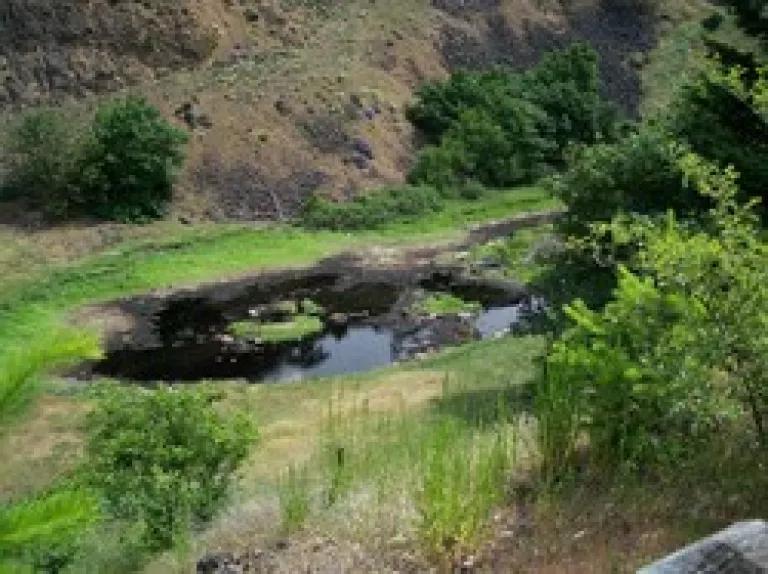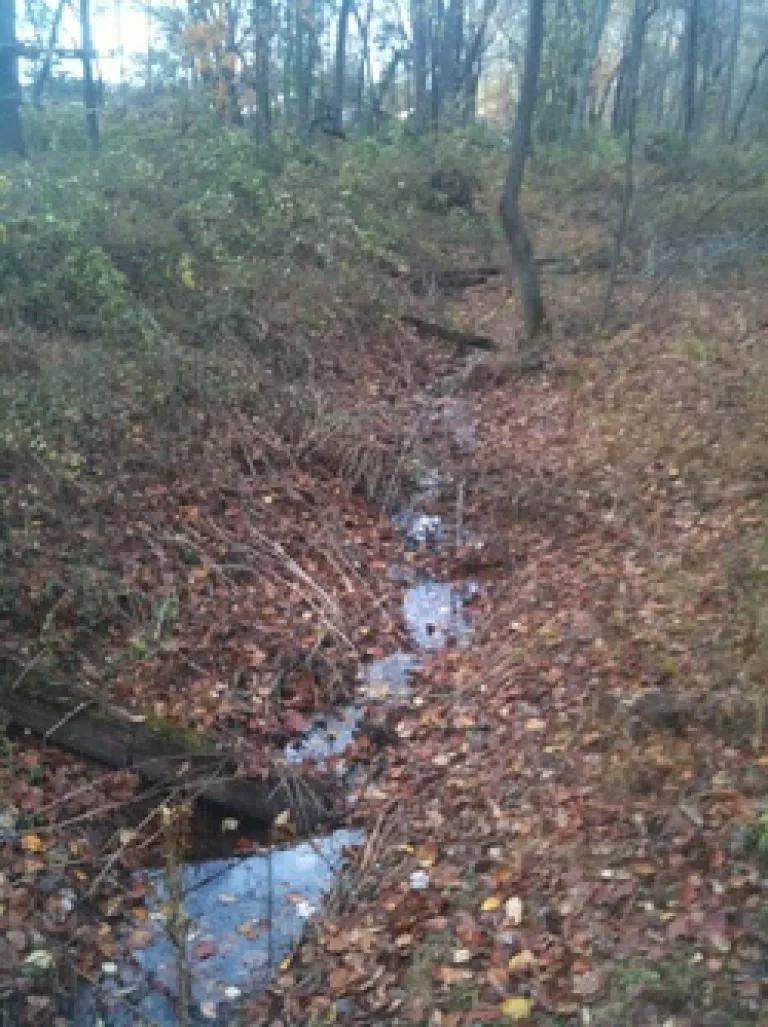
Imagine you're a United States Senator and you aren't much of a fan of the Clean Water Act, notwithstanding the fact that it has been a tremendously successful and wildly popular law for more than 40 years. If you wanted to effectively repeal the law, but leave it nominally in place (for fear of the citizen outrage you might spark with a frontal assault, for instance), how would you do it? Here's how: attack the one section of the law that drives how it works - the provision that defines what kinds of water bodies it protects. Virtually all of the law's most critical pollution control programs depend on this requirement, so it's notable when members of Congress seek to gut it, as several Senators recently did.
Senator Rand Paul (R-KY), joined by Senators Ted Cruz (R-TX), Mitch McConnell (R-KY), Marco Rubio (R-FL), Orrin Hatch (R-UT), and Mike Lee (R-UT), last week introduced a bill that would cut back on the coverage of the Clean Water Act so much that it would be barely worth the paper it's printed on. This post analyzes how the bill accomplishes that dirty result. If you find it convincing, and think your Senator shouldn't touch this thing with a ten-foot pole, please let him/her know. (You can access a list of Senators and contact information from this link.)
Before I get into a detailed analysis of this terrible bill, an important note: staying off this legislation, but supporting other efforts to derail the administration's development of the Clean Water Rule (like the bill that I discussed in a prior post, and that the House of Representatives is likely to consider next week, would do) is not acceptable. Because the Clean Water Rule is critically needed to protect our drinking water supplies, opposing it makes your member of Congress a clean water opponent.
Section-by-section analysis of S. 980
Section 1 names the bill the "Defense of Environment and Property Act of 2015." That's a bad start, as even the title is false. As discussed in detail below, the bill would destroy the Clean Water Act's ability to keep waterways clean and to restore polluted ones. Moreover, it undermines property owners' ability to use their land by making it easy for upstream industrial operations to destroy and dump toxic chemicals into water bodies that flow through peoples' homes and farms.
Section 2 of the bill is the legislation's most dastardly provision. It would, in various ways, deny pollution safeguards to the vast majority of the nation's water bodies. Here are a few:
The bill would limit protection under the Act only to water bodies that are navigable-in-fact or are "permanent, standing, or continuously flowing bodies of waters commonly known as streams, oceans, rivers, and lakes that are connected to waters that are navigable-in-fact." By listing streams, oceans, rivers, and lakes, the bill appears to exclude wetlands, which typically are not navigable, but which have been federally protected for several decades and which any responsible clean water policy would protect. Wetlands provide numerous public services, including flood control, pollutant filtration, groundwater recharge, and wildlife habitat.

The bill would deny protection for so-called "isolated" waters unless they happen to be actually navigable, because the bill would exclude water bodies unless they physically abut other defined "navigable waters" or have a "continuous surface water connection to navigable waters...." However, these water bodies are critical resources that commonly are connected to larger waters by groundwater and can affect downstream waters through that path. Moreover, the fact that certain water bodies lack a physical surface connection can itself be important for downstream water conditions - the separation allows these disconnected waters to trap heavy rains that would otherwise cause flooding downstream, and capture and remove pollutants that are toxic or that cause slimy algal blooms.

A ridiculously vague and poorly-drafted provision of the bill further excludes both natural and man-made features "that periodically provide drainage for rainfall...." Read literally, this language could exclude virtually any water body from the Clean Water Act. Try to imagine a waterway that doesn't periodically provide drainage for rainfall.
A separate part of section 2 adds a new and open-ended invitation to attack all manner of pollution protections. It says that "[a]n activity carried out by the Administrator or the Corps of Engineers shall not, without explicit state authorization, impinge upon the traditional and primary power of States over land and water use." For starters, the bill doesn't identify what's included among the "traditional and primary power of States over land and water use," nor does it explain how one would determine if an action would "impinge" on such power. Moreover, it seems as though it could apply to any action by EPA or the Corps, including EPA rules governing clean air, hazardous waste disposal, and toxic chemicals. I can only imagine the delight amongst lawyers for polluting industries should this become law. They will be all over this language arguing that any polluting action involves land or water use and thus is off-limits to federal action: "Why, yes, my client is burying millions of gallons of toxic sludge in rusted out barrels next to a creek that flows through a public park, but he's just using his land, which the states have 'traditional and primary power' over, so get lost, EPA."
Section 3 of the bill seems intended to wipe out prior administrative actions by EPA and the Army Corps, and to bar the agencies from taking future action to develop clarifying rules or explanatory material for the benefit of regulated entities as well as concerned citizens. Oddly, while it wipes out several actions, the bill would also leave in place a hodge-podge of pre-existing rules and guidelines. This suggests one of two things, neither good: either the authors of this bill don't fully understand the history they are seeking to change, or they want to retain a potpourri of conflicting and outdated documents, so as to leave the people responsible for implementing and complying with the law hopelessly confused.
Section 4 of the bill states something that has always been obvious in the Clean Water Act and that nobody thinks should change, namely that states have the authority to regulate waters in their states. The same section says that this new bill wouldn't change landowners' responsibility if they create a nuisance. However, one wonders, having listed only nuisance, if the bill would impliedly repeal other traditional state common law remedies; thus, like much of this bill, this provision will be read as an open invitation to polluters' lawyers to attack existing safeguards against fouling and destroying waterways.
Section 5 of the bill generally prohibits entry onto private property by federal pollution control authorities to collect information about waters for which the bill authorizes regulation. Officials seeking to inspect a pollution source or follow up on a citizen complaint about an illegal discharge could only conduct such an investigation with the consent of the owner and subject to other conditions. This provision undoes basic Clean Water Act enforcement authority that has long been in the law. It also appears to apply even in the case of alleged criminal violations of the law and in the case of emergency and hazardous situations. The bill would therefore give polluters a way of preventing meaningful oversight of their actions and covering up grossly illegal pollution. That is not good news for anybody who happens to live downstream of a facility that would rather not have law enforcement scrutiny.
Section 6 likely would prevent all manner of future federal water pollution rules. It requires the government to pay "twice the value of the loss" to any property owner whose property is diminished in value by "a Federal regulation relating to the definition of navigable waters or waters of the United States...." As I noted at the outset, virtually all regulations under the Clean Water Act relate to the provision defining which waters are protected, such that this compensation provision conceivably could apply to a host of regulations under the law, including ones limiting the amount of toxic pollution that major facilities can discharge. But the provision doesn't only frustrate rules by making it a financially risky proposition for the government; it also includes an impossible-to-administer restriction on whether the rules can ever take effect, by saying that any rule subject to the section (again, which would likely include most Clean Water Act rules) cannot have force or effect "until the date on which each landowner with a claim ... relating to that regulation has been compensated...." But there is no way to know whether any given person anywhere in the country might be able to make an argument that s/he has such a claim, so the agencies would likely have to wait indefinitely before enforcing the rule, making the entire process pointless.
And, so, there it is - a bill that should be known as the "Clean Water Act Repeal Act of 2015" or, better yet, the "Return to Flammable Rivers Act of 2015." Given how radical it is, it might be tempting to laugh it off as a stunt that's going nowhere, but that wouldn't be prudent. The bill already has the backing of Majority Leader McConnell, whose Big Polluter Agenda Congress is racing to implement. Please let your Senator know that this bill is awful and should be rejected and, while you're at it, please tell them to let EPA and the Army Corps of Engineers finish the job of restoring Clean Water Act protections for the nation's critical water bodies.

